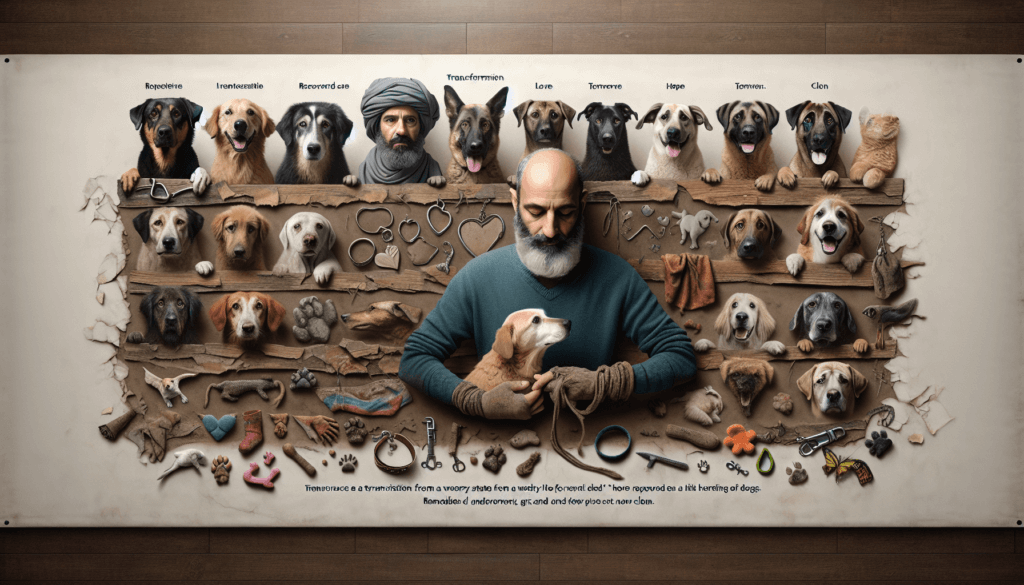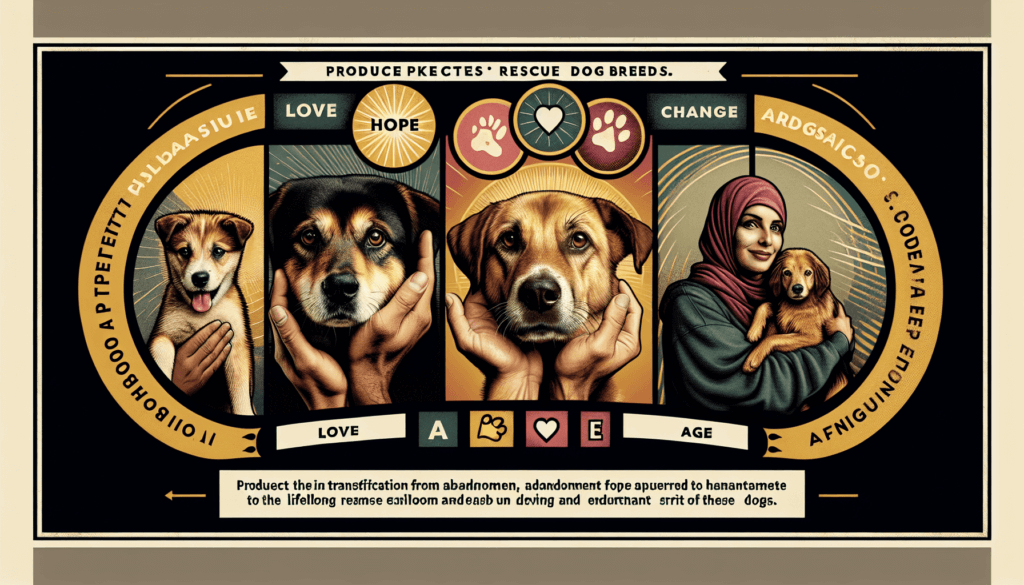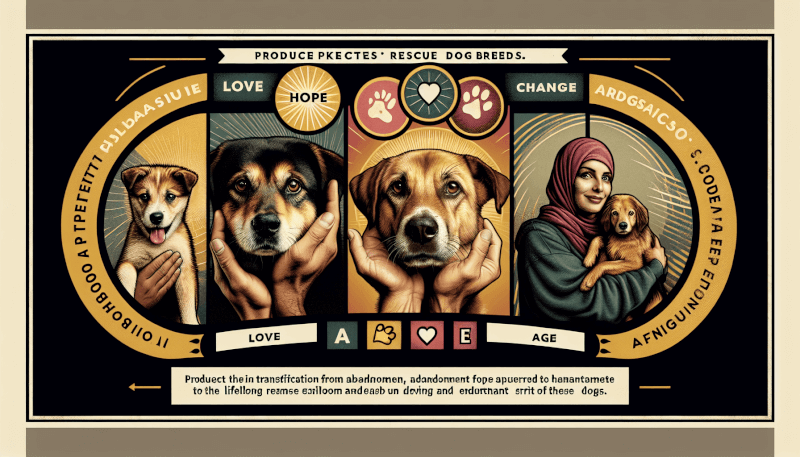Are you thinking about adopting a new furry friend? Look no further than rescue dog breeds! These incredible animals are not only loving and loyal companions, but they also have unique qualities that set them apart from other breeds. Whether you’re searching for an energetic and playful pup or a calm and relaxed companion, rescue dog breeds come in all shapes and sizes, ready to steal your heart. In this article, we’ll explore some of the top rescue dog breeds and why they make the perfect addition to any family. Get ready to discover the wonderful world of rescue dogs and find your new best friend!
Benefits of Rescuing a Dog
Saving a Life
One of the most significant benefits of rescuing a dog is the opportunity to save a life. When you choose to adopt a rescue dog, you are giving a second chance to an animal in need. Many rescue dogs have faced difficult and challenging circumstances, including neglect, abuse, or abandonment. By providing a loving and caring home, you are giving them a fresh start and a chance to experience the joys of a happy and fulfilling life.
Building a Strong Bond
Another wonderful benefit of rescuing a dog is the opportunity to build a strong bond. Dogs are known for their unwavering loyalty and unconditional love, and rescue dogs are no exception. When you bring a rescue dog into your life, there is a unique sense of gratitude and appreciation from the animal. They understand that you have given them a second chance, and in return, they will shower you with love, companionship, and endless devotion. The bond between you and your rescue dog will grow stronger over time, creating a meaningful and fulfilling relationship.
Feeling Gratitude
Rescuing a dog not only brings joy and happiness to your life but also fills you with a sense of gratitude. Knowing that you have made a positive impact on the life of a deserving animal can be incredibly rewarding. The gratitude that a rescue dog shows towards their new owner is truly heartwarming. Their wagging tails, happy barks, and affectionate cuddles are constant reminders of the difference that you have made in their lives. Every day, you will be reminded of the incredible decision you made to rescue a dog and the happiness it brings to both of your lives.
Supporting Animal Shelters
When you choose to adopt a rescue dog, you are also supporting animal shelters and rescue organizations. These organizations work tirelessly to rescue, rehabilitate, and rehome abandoned and abused animals. By adopting a rescue dog, you are helping to alleviate the burden on these facilities and create space for more animals in need. Moreover, many animal shelters rely on adoption fees and donations to continue their important work. By adopting a rescue dog, you are directly contributing to their cause and helping them to make a difference in the lives of numerous animals.
Popular Rescue Dog Breeds
Labrador Retriever
Labrador Retrievers are one of the most popular breeds when it comes to rescue dogs. Known for their friendly and outgoing nature, Labs make fantastic family pets. They are known to be great with children, providing them with unconditional love and protection. Labrador Retrievers are also highly intelligent, making them easy to train and adapt to various environments. With their loyal and eager-to-please personalities, Labs are excellent companions for individuals or families looking to rescue a dog.
German Shepherd
German Shepherds are known for their remarkable intelligence, loyalty, and versatility. These qualities make them a popular choice for rescue dogs. With proper training and socialization, German Shepherds can become well-mannered and obedient pets. They are protective of their families and are often used as service dogs or working dogs due to their keen senses and strong work ethic. If you are looking for a confident and loyal companion, a German Shepherd might be the perfect choice for you.
Boxer
Boxers are energetic and playful dogs, making them a great choice for active individuals or families. With their goofy and affectionate nature, Boxers quickly form strong bonds with their owners. They are known to be excellent with children and are often described as a “clown” due to their silly antics. Boxers are also known for their protective instincts, and their loyal and loving nature makes them wonderful family pets. If you are looking for a rescue dog that will bring lots of joy and laughter into your home, a Boxer might be the perfect fit.
Border Collie
Border Collies are highly intelligent and energetic dogs, originally bred for herding livestock. With their natural herding instincts, Border Collies excel in obedience training and can learn a wide range of commands and tricks. While their intelligence and energy make them fantastic working dogs, they can also make wonderful companions for active individuals or families. However, it is important to note that Border Collies require mental stimulation and regular exercise to prevent boredom and destructive behaviors. If you are willing to put in the time and effort, a Border Collie can be an incredibly rewarding rescue dog.

Unique Traits of Rescue Dog Breeds
Loyal and Devoted Companions
One unique trait of rescue dog breeds is their loyalty and devotion. These dogs have often experienced hardships in their past, which makes them appreciate the love and care they receive in their new homes even more. Rescue dogs form deep bonds with their owners, often becoming fiercely loyal companions. They will stand by your side through thick and thin, offering unwavering support and unconditional love. The loyalty and devotion of a rescue dog are truly remarkable and can bring immeasurable joy and comfort to your life.
Adaptability and Resilience
Rescue dogs have often faced challenging and unpredictable environments, which has made them incredibly adaptable and resilient. They have learned to navigate through different situations and overcome obstacles in order to survive. This adaptability and resilience make rescue dogs excellent companions for individuals with varying lifestyles and living situations. Whether you live in a small apartment or a large house, a rescue dog will be able to adjust and thrive in their new environment.
Mixed Breeds with Unique Personalities
Rescue dogs often come in a variety of shapes, sizes, and breeds. Many rescue dogs are mixed breeds, which can result in unique and one-of-a-kind personalities. These mixed breed dogs often possess a combination of traits from their various parent breeds, making them incredibly unique and special. Adopting a mixed breed rescue dog means that you are getting a truly one-of-a-kind companion with a personality all their own. Each day will bring new surprises and moments of discovery as you uncover the distinct characteristics of your rescue dog.
Considerations Before Adopting a Rescue Dog
Assessing Your Lifestyle and Commitment
Before adopting a rescue dog, it is essential to assess your lifestyle and level of commitment. Owning a dog requires time, effort, and financial resources. Consider your daily routine, work schedule, and social activities to determine if you can provide the necessary time and attention a rescue dog needs. Additionally, take into account factors such as exercise requirements, grooming needs, and potential training or behavioral issues. It is important to ensure that you are fully prepared and capable of meeting the physical and emotional needs of a rescue dog before bringing one into your home.
Understanding Behavioral Challenges
Rescue dogs often come with behavioral challenges that require patience, understanding, and training to overcome. These challenges may include fear, anxiety, aggression, or separation anxiety. It is important to educate yourself about these potential issues and determine if you have the skills and resources to address them. Working with a professional dog trainer or behaviorist can be beneficial in helping your rescue dog overcome any obstacles they may face. By understanding the potential behavioral challenges that may arise, you can better prepare yourself for the journey of rescuing a dog.
Training and Socialization Needs
Training and socialization are crucial aspects of owning a dog, particularly for rescue dogs. Many rescue dogs may have lacked proper training or socialization in their past, which can result in behavioral issues or challenges. It is essential to commit to providing ongoing training and socialization to your rescue dog to ensure they become well-behaved and confident companions. Enrolling in obedience classes or working with a professional trainer can be incredibly beneficial in establishing a strong foundation of training and socialization for your rescue dog.

Finding a Rescue Dog
Local Animal Shelters and Rescue Organizations
One of the best places to find a rescue dog is through local animal shelters and rescue organizations. These facilities are dedicated to rescuing and rehoming dogs in need, and they often have a variety of breeds and sizes available for adoption. Visiting your local animal shelter allows you to meet potential rescue dogs in person, interact with them, and get to know their personalities. The staff at the shelter can also provide valuable information about each dog’s background, temperament, and needs, helping you make an informed decision about which dog is the best fit for your home and lifestyle.
Online Platforms and Websites
In addition to local shelters, there are also numerous online platforms and websites where you can find rescue dogs available for adoption. These websites often feature profiles of individual dogs, including their photos, descriptions, and information about their backgrounds. Online platforms allow you to search for specific criteria such as breed, age, and location, making it easier to find a rescue dog that meets your preferences. However, it is important to exercise caution when adopting a dog online and ensure that you are dealing with reputable organizations or individuals.
Breed-Specific Rescue Groups
For individuals specifically interested in certain breeds, breed-specific rescue groups can be a great option. These organizations focus on rescuing and rehoming a particular breed or a specific mix of breeds. Breed-specific rescue groups have extensive knowledge and experience with the breed, and they can provide valuable insights and guidance throughout the adoption process. By working with a breed-specific rescue group, you can find a rescue dog that matches your desired breed characteristics and traits.
Preparing Your Home for a Rescue Dog
Creating a Safe and Comfortable Environment
Before bringing a rescue dog home, it is important to create a safe and comfortable environment for them. This includes securing any potential hazards or dangers, such as toxic plants or chemicals, sharp objects, or small items that could be swallowed. Ensure that your home is free from any loose wires or cords that could pose a risk to your new pet. Providing a comfortable and cozy space for your rescue dog, such as a designated bed or crate, will help them feel secure and at ease in their new surroundings.
Gathering Essential Supplies
To ensure a smooth transition for your rescue dog, gather all the essential supplies they will need before bringing them home. This includes items such as food and water bowls, a leash and collar or harness, a comfortable bed, toys, and grooming supplies. Having these supplies readily available will help you establish a routine and provide your rescue dog with everything they need to feel comfortable and cared for.
Establishing a Routine
Establishing a routine is crucial for a rescue dog’s well-being and adjustment to their new home. Dogs thrive on routine and consistency, as it provides them with a sense of security and predictability. Set a schedule for feeding times, walks, playtime, and training sessions to help your rescue dog settle into their new life. Consistency and structure will help your rescue dog feel more at ease and establish a sense of belonging in their new surroundings.
Adopting and Bringing Home a Rescue Dog
The Adoption Process
The adoption process for a rescue dog usually involves several steps to ensure that the best match is made between the dog and the potential owner. This process may include filling out an application, providing references, and participating in an interview or home visit. The shelter or rescue organization may also require a nominal adoption fee to cover the cost of veterinary care and other expenses. The adoption process is designed to ensure that the rescue dog finds a loving and suitable forever home, and it offers an opportunity for you to ask questions and gather all the necessary information about the dog before bringing them home.
Introducing the Dog to Your Home
When you bring your rescue dog home, it is important to introduce them to their new environment gradually. Start by confining them to a specific area of the house, such as a bathroom or a designated room, to allow them to acclimate to their surroundings. Slowly introduce them to other areas of the house once they become comfortable. Supervise their interactions with any existing pets or children, ensuring that the introductions are done in a calm and controlled manner. Providing a safe and calm environment during the initial days will help your rescue dog feel secure and ease their transition into their new home.
Establishing Boundaries and Rules
Establishing boundaries and rules from the beginning is crucial for a rescue dog’s successful integration into your home. Consistent and clear rules will help your rescue dog understand what is expected of them and reduce any potential confusion or anxiety. Determine which areas of the house are off-limits, establish rules about furniture or sleeping arrangements, and establish training commands and expectations. Setting boundaries and rules in a positive and consistent manner will help your rescue dog feel secure and reinforce their place in your home.
Caring for a Rescue Dog
Proper Nutrition and Exercise
Proper nutrition and regular exercise are essential components of caring for a rescue dog. Consult with your veterinarian to determine the appropriate diet for your dog’s age, breed, and any specific health concerns. Providing a well-balanced diet that meets their nutritional needs will help your rescue dog maintain a healthy weight and overall well-being. Additionally, regular exercise is crucial for a dog’s physical and mental health. Engage in activities such as daily walks, play sessions, or agility training to keep your rescue dog active and stimulated.
Grooming and Hygiene
Grooming and hygiene are important aspects of caring for a rescue dog. Depending on the breed, your dog may require regular brushing to prevent matting and keep their coat healthy. Additionally, regular baths, nail trims, and ear cleanings are essential to maintain your dog’s cleanliness and prevent any potential health issues. Establish a grooming routine that suits your dog’s specific needs and seek professional grooming services when necessary.
Veterinary Care and Regular Check-ups
Regular veterinary care is crucial for the health and well-being of your rescue dog. Schedule regular check-ups with your veterinarian and ensure that your dog receives all necessary vaccinations and preventive treatments, such as flea and tick prevention and heartworm medication. Regular dental care, including teeth brushing or professional cleanings, is also important to maintain your dog’s oral health. Establishing a relationship with a trusted veterinarian will provide you with valuable guidance and support in caring for your rescue dog’s overall health.
Overcoming Challenges with Rescue Dogs
Patience and Understanding
Rescue dogs may come with behavioral or emotional challenges that require patience and understanding. They may exhibit fear, anxiety, or other undesirable behaviors due to their past experiences. It is important to approach these challenges with patience and empathy, allowing your dog time to adjust and feel comfortable in their new environment. Building trust and establishing a strong bond takes time, but with love, consistency, and understanding, you can help your rescue dog overcome any obstacles they may face.
Working with Professional Trainers
In some cases, professional training or behavior intervention may be necessary to address specific challenges or issues with your rescue dog. Working with a professional dog trainer or behaviorist can provide you with valuable guidance and techniques to help your rescue dog overcome any behavioral obstacles. These professionals have the knowledge and experience to develop tailored training plans and provide you with the tools to address any behavioral concerns effectively.
Building Trust and Confidence
Rescue dogs may have experienced trauma or neglect, which can impact their trust and confidence. Building trust and confidence with your rescue dog is a gradual process that requires patience and consistency. Always approach your dog with calmness and respect, and provide positive reinforcement for good behavior. Consistent training and socialization will also help build your dog’s confidence and teach them how to navigate the world around them.
Long-term Benefits of Rescuing a Dog
Improved Mental and Physical Health
Owning a rescue dog can have numerous long-term benefits for your mental and physical health. Numerous studies have shown that the companionship and unconditional love of a dog can reduce stress, anxiety, and depression. Interacting with a rescue dog can increase the production of oxytocin, a hormone associated with positive emotions and bonding. Additionally, owning a dog often leads to increased physical activity, as dogs require daily exercise. Regular exercise can improve cardiovascular health, reduce the risk of obesity, and increase overall well-being.
Teaching Compassion and Responsibility
Rescuing a dog is not only a wonderful act of compassion but also an opportunity to teach and instill these values in others. By adopting a rescue dog, you are setting an example of kindness and empathy for your family, friends, and community. In addition, caring for a rescue dog requires a level of responsibility and commitment. This responsibility can teach children and adults alike the importance of meeting the needs of another living being and being accountable for their well-being.
Creating Lasting Memories
One of the most beautiful long-term benefits of rescuing a dog is the creation of lasting memories. The bond and experiences shared with your rescue dog will become cherished memories that you will carry with you throughout your life. From the moment you bring your rescue dog home to the countless adventures, laughter, and love shared over the years, the memories created with your rescue dog will be etched in your heart forever. The joy, happiness, and unconditional love that a rescue dog brings into your life are truly priceless and will leave a lasting impact that you will treasure for a lifetime.
In conclusion, rescuing a dog is an immensely rewarding and fulfilling experience. By saving a life, building a strong bond, and feeling gratitude, you not only bring joy and companionship into your own life but also support animal shelters and make a positive impact in the lives of countless animals. Popular rescue dog breeds such as Labrador Retrievers, German Shepherds, Boxers, and Border Collies all have unique traits and personalities that make them wonderful companions. Before adopting a rescue dog, consider your lifestyle and commitment, understand behavioral challenges, and be prepared to provide training and socialization. Finding a rescue dog can be done through local animal shelters, online platforms, and breed-specific rescue groups. To prepare your home, create a safe and comfortable environment, gather essential supplies, and establish a routine. When adopting and bringing home a rescue dog, go through the adoption process, introduce the dog to your home gradually, and establish boundaries and rules. Caring for a rescue dog involves proper nutrition and exercise, grooming and hygiene, as well as regular veterinary care. Overcoming challenges with rescue dogs requires patience, understanding, working with professional trainers, and building trust and confidence. The long-term benefits of rescuing a dog include improved mental and physical health, teaching compassion and responsibility, and creating lasting memories. So, open your heart and home to a rescue dog and experience the incredible rewards that come with it.


